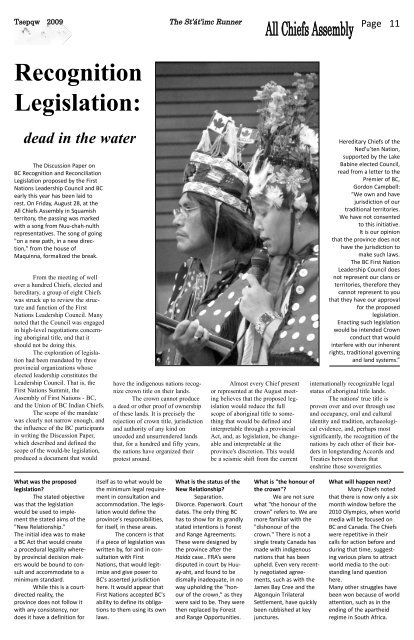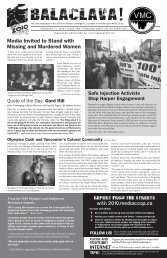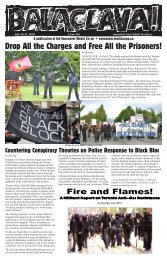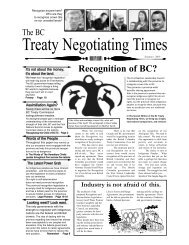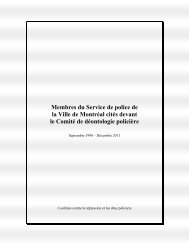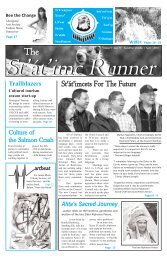St’át’imc Runner
september fp 09_Layout 1 - The Media Co-op
september fp 09_Layout 1 - The Media Co-op
You also want an ePaper? Increase the reach of your titles
YUMPU automatically turns print PDFs into web optimized ePapers that Google loves.
Tsepqw 2009<br />
The <strong>St’át’imc</strong> <strong>Runner</strong><br />
All Chiefs Assembly<br />
Page 11<br />
Recognition<br />
Legislation:<br />
dead in the water<br />
The Discussion Paper on<br />
BC Recognition and Reconciliation<br />
Legislation proposed by the First<br />
Nations Leadership Council and BC<br />
early this year has been laid to<br />
rest. On Friday, August 28, at the<br />
All Chiefs Assembly in Squamish<br />
territory, the passing was marked<br />
with a song from Nuu-chah-nulth<br />
representatives. The song of going<br />
"on a new path, in a new direction,"<br />
from the house of<br />
Maquinna, formalized the break.<br />
From the meeting of well<br />
over a hundred Chiefs, elected and<br />
hereditary, a group of eight Chiefs<br />
was struck up to review the structure<br />
and function of the First<br />
Nations Leadership Council. Many<br />
noted that the Council was engaged<br />
in high-level negotiations concerning<br />
aboriginal title, and that it<br />
should not be doing this.<br />
The exploration of legislation<br />
had been mandated by three<br />
provincial organizations whose<br />
elected leadership constitutes the<br />
Leadership Council. That is, the<br />
First Nations Summit, the<br />
Assembly of First Nations - BC,<br />
and the Union of BC Indian Chiefs.<br />
The scope of the mandate<br />
was clearly not narrow enough, and<br />
the influence of the BC participants<br />
in writing the Discussion Paper,<br />
which described and defined the<br />
scope of the would-be legislation,<br />
produced a document that would<br />
have the indigenous nations recognize<br />
crown title on their lands.<br />
The crown cannot produce<br />
a deed or other proof of ownership<br />
of these lands. It is precisely the<br />
rejection of crown title, jurisdiction<br />
and authority of any kind on<br />
unceded and unsurrendered lands<br />
that, for a hundred and fifty years,<br />
the nations have organized their<br />
protest around.<br />
Almost every Chief present<br />
or represented at the August meeting<br />
believes that the proposed legislation<br />
would reduce the full<br />
scope of aboriginal title to something<br />
that would be defined and<br />
interpretable through a provincial<br />
Act, and, as legislation, be changeable<br />
and interpretable at the<br />
province's discretion. This would<br />
be a seismic shift from the current<br />
Hereditary Chiefs of the<br />
Ned’u’ten Nation,<br />
supported by the Lake<br />
Babine elected Council,<br />
read from a letter to the<br />
Premier of BC,<br />
Gordon Campbell:<br />
“We own and have<br />
jurisdiction of our<br />
traditional territories.<br />
We have not consented<br />
to this initiative.<br />
It is our opinion<br />
that the province does not<br />
have the jurisdiction to<br />
make such laws.<br />
The BC First Nation<br />
Leadership Council does<br />
not represent our clans or<br />
territories, therefore they<br />
cannot represent to you<br />
that they have our approval<br />
for the proposed<br />
legislation.<br />
Enacting such legislation<br />
would be intended Crown<br />
conduct that would<br />
interfere with our inherent<br />
rights, traditional governing<br />
and land systems.”<br />
internationally recognizable legal<br />
status of aboriginal title lands.<br />
The nations' true title is<br />
proven over and over through use<br />
and occupancy, oral and cultural<br />
identity and tradition, archaeological<br />
evidence, and, perhaps most<br />
significantly, the recognition of the<br />
nations by each other of their borders<br />
in longstanding Accords and<br />
Treaties between them that<br />
enshrine those sovereignties.<br />
What was the proposed<br />
legislation?<br />
The stated objective<br />
was that the legislation<br />
would be used to implement<br />
the stated aims of the<br />
"New Relationship."<br />
The initial idea was to make<br />
a BC Act that would create<br />
a procedural legality whereby<br />
provincial decision makers<br />
would be bound to consult<br />
and accommodate to a<br />
minimum standard.<br />
While this is a courtdirected<br />
reality, the<br />
province does not follow it<br />
with any consistency, nor<br />
does it have a definition for<br />
itself as to what would be<br />
the minimum legal requirement<br />
in consultation and<br />
accommodation. The legislation<br />
would define the<br />
province's responsibilities,<br />
for itself, in these areas.<br />
The concern is that<br />
if a piece of legislation was<br />
written by, for and in consultation<br />
with First<br />
Nations, that would legitimize<br />
and give power to<br />
BC's asserted jurisdiction<br />
here. It would appear that<br />
First Nations accepted BC's<br />
ability to define its obligations<br />
to them using its own<br />
laws.<br />
What is the status of the<br />
New Relationship?<br />
Separation.<br />
Divorce. Paperwork. Court<br />
dates. The only thing BC<br />
has to show for its grandly<br />
stated intentions is Forest<br />
and Range Agreements.<br />
These were designed by<br />
the province after the<br />
Haida case.. FRA’s were<br />
disputed in court by Huuay-aht,<br />
and found to be<br />
dismally inadequate, in no<br />
way upholding the "honour<br />
of the crown," as they<br />
were said to be. They were<br />
then replaced by Forest<br />
and Range Opportunities.<br />
What is "the honour of<br />
the crown"?<br />
We are not sure<br />
what "the honour of the<br />
crown" refers to. We are<br />
more familiar with the<br />
"dishonour of the<br />
crown." There is not a<br />
single treaty Canada has<br />
made with indigenous<br />
nations that has been<br />
upheld. Even very recently<br />
negotiated agreements,<br />
such as with the<br />
James Bay Cree and the<br />
Algonquin Trilateral<br />
Settlement, have quickly<br />
been rubbished at key<br />
junctures.<br />
What will happen next?<br />
Many Chiefs noted<br />
that there is now only a six<br />
month window before the<br />
2010 Olympics, when world<br />
media will be focused on<br />
BC and Canada. The Chiefs<br />
were repetitive in their<br />
calls for action before and<br />
during that time, suggesting<br />
various plans to attract<br />
world media to the outstanding<br />
land question<br />
here.<br />
Many other struggles have<br />
been won because of world<br />
attention, such as in the<br />
ending of the apartheid<br />
regime in South Africa.


